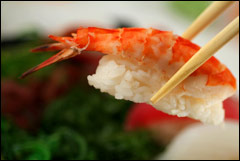Dear Umbra,
My wife and I love sushi, but we’re increasingly concerned about sustainable harvesting. Although we treat ourselves to sushi only once or twice a month, it adds up, and we can’t help but wonder about the impact. There’s no sensation in the world like letting a slab of sashimi salmon dissolve in your mouth, but can my wife and I continue to enjoy sushi without feeling guilty? What can people like us — environmentally conscious, politically aware but inactive — do to support more sustainable fishing practices through our sushi-bar purchases?
Geoff Mann
Howell, Mich.
Dearest Geoff,
Sushi. Yum. Let me share my primary motivation for answering this question, which is that I feel your pain. Love sushi, am environmentally aware (after years of toiling in the research basement), am of child-bearing age, so I worry about toxics on top of sustainability. My short answer is this: of course you can continue to eat at sushi restaurants without feeling guilty. What you should do instead of feeling guilty — and this applies in all situations, not just sushi restaurants — is make a plan.

It’s a sordid tail.
Photo: iStockphoto
You know, like, if you are feeling guilty about driving your car, make a plan to drive it less (is anyone noticing my ability to relate driving to any topic?). If you are feeling guilty about eating fish, look up which fishies are in trouble, and eschew chewing a few. Sounds simple, and it is, if you follow my step-by-step food-revulsion regimen.
First, choose a nice educational website about depleted fisheries and toxics in fishy tissues. The Monterey Bay Aquarium, the Audubon Society, Environmental Defense, and the Blue Ocean Institute are a few places to begin. I also recommend poking around the Marine Stewardship Council site — they certify sustainable fish, and have a list of stores that sell it, in case you get ambitious and decide to make your own sushi.
Read all about the aquatic life you like to eat. (I say aquatic life because unagi — eel — is one of my favorites, and I don’t think it’s a fish.) Educate yourself about the species. (Holy cow! Eels are fish! Better yet, young eels are called elvers. Zounds!) Learn how they are produced or harvested, which types to avoid, which to eat. Don’t forget to read about toxics in fish — especially you ladies out there. You can even measure your seafood-related mercury intake with this handy calculator.
Through this process, your personal revulsion meter — which, as you’ll remember from seventh grade, is part of your autonomic nervous system — will decide which fish are OK and which you will want to avoid. I, for example, never liked shrimp. It’s even more tasteless than cashews, with the texture of packing peanuts. But other people oohed and ahhed about shrimp, so I kept eating it, thinking that it must be tasty and I was just stupid. Luckily for me, shrimp farming is stunningly destructive. Now I don’t just dislike shrimp, I find it ethically revolting. So handy.
On the other hand, I do like salmon, but I avoid it because of the health advisories associated even with wild salmon, not to mention the farmed version probably served at my local sushi joint. Same with tuna, which has perhaps suffered the most at the hands of the sushi industry.
My point is — and this will happen to conscientious meat-eaters of all stripes over time — through education you will become a picky fish eater. Sure, food that melts in your mouth is lovely, but if when you’re savoring that you also picture the salinization of groundwater, or the stripping of reefs, or persistent organic pollutants entering your fatty tissue, somehow the melting becomes less enticing.
This is why people often do not want to know the truth about what we are doing to the environment. They fear the pleasures of life will be taken from them. Au contraire. I say you can have your fish and eat it too. Sushi restaurant menus are diverse, and Japanese dining is 50 percent food, 50 percent aesthetic experience. Your happiness will not be dimmed. It will increase, because you will not be eating guilt wrapped in rice.
Nigiri,
Umbra

